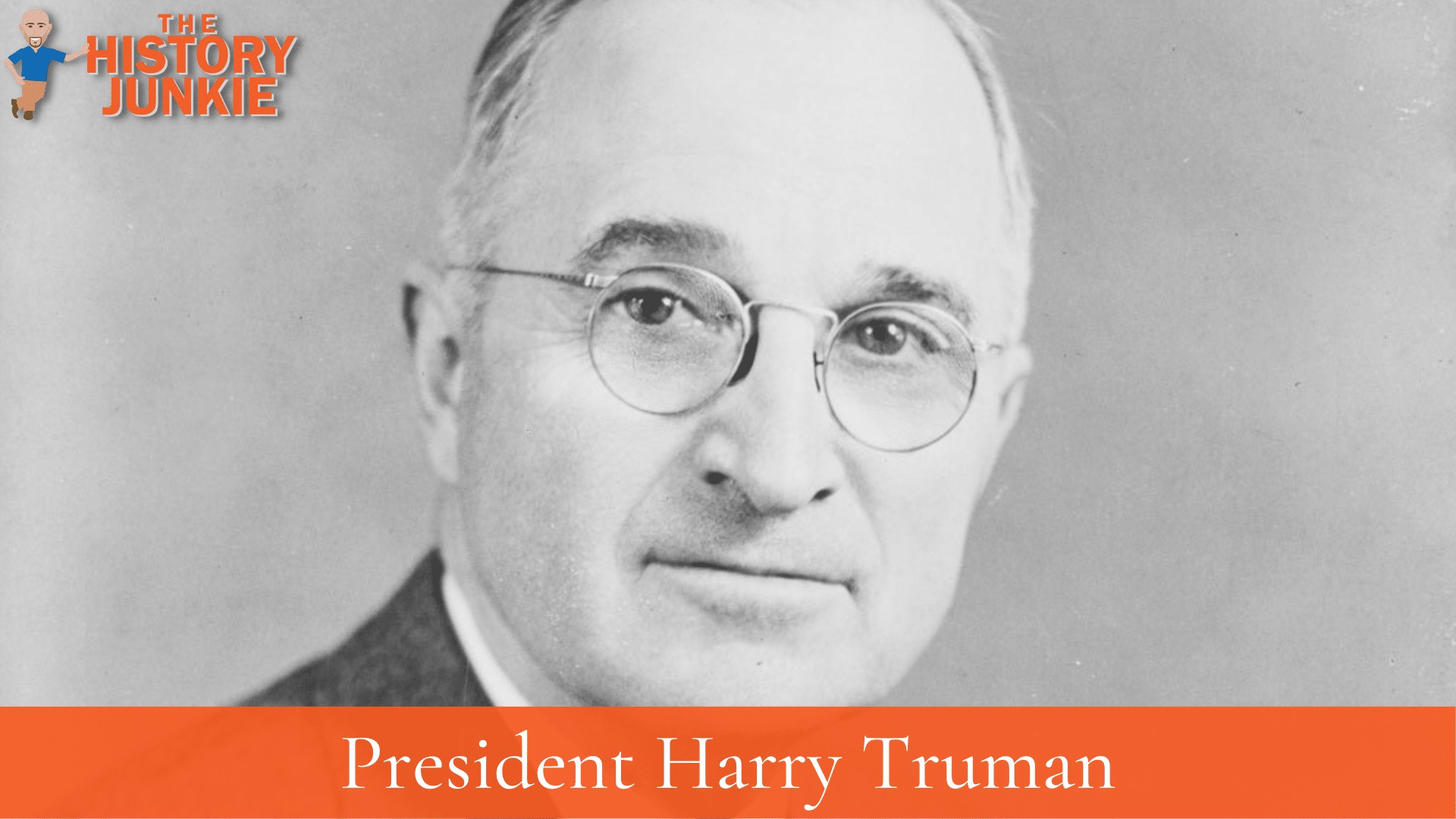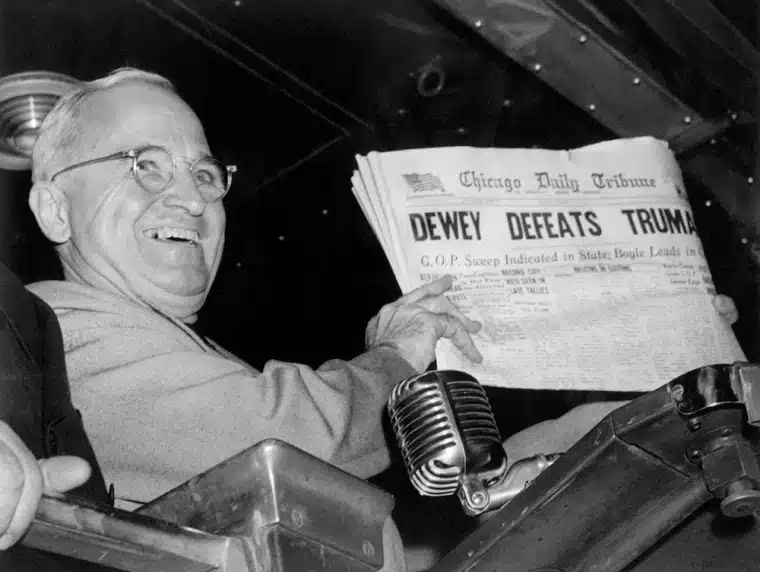April 12, 1945: Harry Truman became the 33rd President of the United States after the death of Franklin Roosevelt.

April 24, 1945: The United Nations meets for the first time in San Francisco, California. Fifty nations were in attendance.
May 8, 1945: V-E Day in Europe occurs when the Allies defeat the NAZIs.
Jump to:
July 16, 1945: The United States detonates the first atomic bomb in Alamogordo, New Mexico.
July 17 - August 2, 1945 - Harry Truman meets for the first time with Winston Churchill and Joseph Stalin as President. They discuss how to divide up Germany. They agree to divide Germany into 4 territories. During this conference, it was discussed that Russia would be given greater reparations due to taking more losses than the Nazis (It did not consider that they were once allied with them). This conference was called the Potsdam Conference.
August 6 - 9, 1945 - The first atomic bomb was dropped on Hiroshima, Japan. A second was dropped on Nagasaki, Japan.
August 14, 1945 - Japan surrenders, ending World War 2.
September 6, 1945 - Truman submits a 21-point plan to reconvert the American economy to a peacetime economy. It is rejected by Congress.
January 20, 1946 - Truman created the CIA by executive order. The Central Intelligence Agency is commissioned to spy on foreign countries.
February 20, 1946 - Truman signs the Full Employment Act.
February 22, 1946 - The first signs of a future United States policy known as the containment policy emerged when George Kennan published a paper called the "Long Telegram."
March 5, 1946 - Winston Churchill delivers the famous "Iron Curtain" speech.
May 22, 1946 - The Emergency Housing Bill is signed by Truman, which allows the construction of 2.5 million housing units for over 2 years.
July 4, 1946 - Truman fulfills a promise made to the Philippines in 1898 and grants their independence.
August 1, 1946 - Truman signs the McMahon Act, which prohibits any information about atomic weapons from being distributed in foreign countries.
November 5, 1946 - For the first time since FDR, the Republicans take over Congress.
December 5, 1946 - Truman begins the fight for Civil Rights with the President's Commission on Civil Rights. Most ignore it.
March 12, 1947 - The Truman Doctrine is put into place to block the spread of Communism in Greece and Turkey.
March 21, 1947 - Truman signs an executive order to begin the investigation of Federal Employees and their connection to Communism.
June 5, 1947 - Secretary of State George Marshall proposed the Marshall Plan. It is accepted. The Marshall Plan would help European economies rebuild.
June 23, 1947 - Congress overrides Harry Truman's veto on the Taft-Hartley Act. This would be a major loss for the Unions.
June 29, 1947 - Truman becomes the first President to address the NAACP.
July 26, 1947 - The National Security Act is passed.
February 2, 1948 - A report is released called "To Secure These Rights". It is a push to secure equal rights for all people in the United States.
April 3, 1948 - President Truman signs the Foreign Assistance Act. This will launch the Marshall Plan. It also authorizes military aid to Greece and Turkey.
May 14, 1948 - The United States recognizes the nation of Israel.
June 24, 1948 - In late 1947 and early 1948, the U.S., Britain, and France unite their three German military zones into one zone and created a single currency to be used. This angers the Soviet Union, who, in response, ordered all Western convoys bound for Berlin through Soviet Germany to be searched. Western officials refused to comply, and Stalin orders a blockade that became known as the Berlin Blockade.
June 25, 1948 - Truman signs the Displaced Persons Bill that allows the admission of 205,000 displaced Europeans to the United States. The number will eventually rise to 415,000.
June 26, 1948 - The United States begins the Berlin Airlift
July 15, 1948 - Truman is nominated for President by the Democratic Party.
July 17, 1948 - Pro-segregation Democrats nominate Strom Thurman as a Dixiecrat. The Republicans nominated Thomas Dewey as their candidate.
July 26, 1948 - Truman calls for a special session in Congress to work on Civil Rights legislation.
July 30, 1948 - Truman signs an executive order that ends segregation in the military.
November 2, 1948 - In a surprising victory, President Harry Truman beats Dewey to win the presidency.

January 5, 1949 - At his inauguration, President Truman calls for a Fair Deal.
Second Term
April 4, 1949 - NATO is created. This alliance was created to buffer the rising threat of the Soviet Union.
May 12, 1949 - The Berlin Blockade ends.
May 31, 1949 - Alger Hiss goes on trial for espionage. He is accused of being a Communist spy.
July 15, 1949 - The Housing Act is signed. The federal government began building low-income housing.
September 22, 1949 - President Truman signs the Mutual Defense Assistance Bill. This bill authorizes military assistance to NATO.
September 23, 1949 - America learns that the Soviet Union has detonated its first atomic bomb.
October 15, 1949 - President Harry Truman meets with Douglas MacArthur for the first time. They discuss what America's Far East foreign policy should look like.
November 20, 1950 - General MacArthur angers President Truman when he advances into Chinese territory. This action also angers the Chinese, who view it as a declaration of war.
November 25, 1950 - China launches a counter-attack on the United States. The Chinese forced the Americans to retreat.
December 16, 1950 - Truman announces a state of national emergency.
January 1, 1951 - North Korean forces take Seoul. It would only stay in their hands for a few months.
February 22, 1951 - The 22nd Amendment is passed. The amendment limits presidents to serving two terms. This is a precedent that was set by George Washington until Franklin Roosevelt ran and won a third term.
April 11, 1951 - In a controversial move, President Truman fires Douglas MacArthur. He returns home as a hero.
March 8, 1952 - The Chinese and the Soviet Union accused the United States of employing germ warfare in Korea.
March 29, 1952 - President Harry Truman announces he will not seek another term as President.
April 6, 1952 - President Harry Truman announces the production of a Hydrogen Bomb.
April 8, 1952 - In an effort to prevent the shutdown of steel mills, President Truman seized them with the power of the federal government. This act would be considered unconstitutional and hurt Truman's approval ratings, which were already sagging.
June 26-27, 1952 - Congress overrides Truman's veto of the McCarren-Walter Act.
July 11, 1952 - Dwight D. Eisenhower wins the Republican nomination for President.
July 26, 1952 - Adlai Stevenson is nominated as the Democratic candidate for President.
November 1, 1952 - The United States detonated the first Hydrogen Bomb.

November 4, 1952 - Dwight Eisenhower wins the election of 1952.
